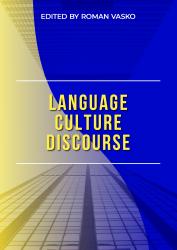Cognitive religious-biblical model of behaviour in representatives of different linguistic cultures in crisis situations
Keywords:
behaviour model, psycholinguistics, stress factor, religious-biblical model, linguistics, discourse, social networksSynopsis
The chapter gives a brief overview of the concept of "behaviour model" in sociology, psychology, sociolinguistics and psycholinguistics. The regulatory concept of the way out of the crisis stress situation is presented due to the appeal of representatives of different linguistic cultures to religious truths. An axiological model of overcoming stress-factors (pandemic and military situation in the country) is proposed through moral-ethical spiritual stimuli, which help to achieve balance between emotional and physiological tension, find positive energy and psychological unloading. Addi- tional factors of influence on the psychological state of a person in a crisis situation are described, namely uncertainty of own position in a crisis situation, excessive attention to information in social networks, emotional combustion, presence/absence of spiritual living standards, ability to shift focus of attention, high level of responsibility for close people / country, type of person.
References
Kuzmenko, T. M. (2013). Sutnisni kharakterystyky ta klasyfikatsiia sotsialnykh hrup: referentna hrupa: vydy ta funktsii. Aktualni problemy sotsiolohii, psykholohii, pedahohiky, 18, 64–77.
Lovochkina, A. M., Stokolos, H. M. (2017). Sotsialno-psykholohichni problemy orhanizatsii volonterskoi diialnosti. Orhanizatsiina psykholohiia. Ekonomichna psykholohiia, 1, 45–52.
Kovtunovich, M. G. (2004). Assotciativnyi eksperiment kak metod vyiavleniia stroeniia struktur dolgovremennoi semanticheskoi pamiati. Psikhologiia vysshikh kognitivnykh protcessov, 143–162.
Zahorodnya, O. F. (2018). Associative fields of social and political lexis in the Ukrainian language world view (computer processing of the psycholinguistic experiment results). Kyiv.
Vasko, R. (2021). The Idea of Harmonising Hypotheses about the Origin of Life on Earth: The Rational Principle – Human Being and His Language. Logos, 106, 80–91. doi: https://doi.org/10.24101/logos.2021.09
Vasko, R., Korolyova, A., Tolcheyeva, T., Kapranov, Y. (2020). Human Language as a Natural Artifact of Planetary-Noospheric Mind: Coevolutionary-Macromutational Reinterpretation. Revista Amazonia Investiga, 9 (34), 17–23. doi: https://doi.org/10.34069/ai/2020.34.10.2
Liashko, O., Kapranov, Y., Cherkhava, O., Nasalevych, T., Riabukha, T. (2021). Methodological algorithm for interpreting intertextuality within the orthodox sermon (case study of the english orthodox sermon fragment). Revista Amazonia Investiga, 10 (43), 123–132. doi: https://doi.org/10.34069/ai/2021.43.07.12
Korolyova, A. (2021). Transformation Stages of Biosphere into Noosphere: from Syncretic Consciousness of Homo to Co-Evolution of Man and Nature. Logos, 108, 92–101. doi: https://doi.org/10.24101/logos.2021.58
Lazer-Pankiv, O., Korolova, N., Stefanova, N. (2021). Functional, Semantic and Linguistic Features of Latin Text on Vanitas Works of Fine Art. WISDOM, 19 (3), 228–242. doi: https://doi.org/10.24234/wisdom.v19i3.527
Stefanova, N., Khrypko, S., Matveev, V., Nykytchenko, O., Ishchuk, A., Pasko, K. (2021). Cybercrime as a Discourse of Interpretations: the Semantics of Speech Silence vs Psychological Motivation for Actual Trouble. International Journal of Computer Science and Network Security, 21 (8), 203–211. doi: https://doi.org/10.22937/IJCSNS.2021.21.8.27
Dilts, R. (2011). Success factor modeling. Conscious leadership and resilience: Orchestrating innovation and fitness for the future. Crown House Publishing.
Antipina, G. S. (1982). Teoretiko-metodologicheskie problemy issledovaniia malykh sotcialnykh grupp. Leningrad: Izdatelstvo Leningradskogo universiteta, 112.
Goroshko, E. I. (2005). Problema provedeniia svobodnogo assotciativnogo eksperimenta. Izvestiia Volgogradskogo gosudarstvennogo pedagogicheskogo universiteta "Filologicheskie nauki", 3, 53–61.
Gottsdanker, R. (1982). Osnovy psikhologicheskogo eksperimenta. Moscow: Izdatelstvo Moskovskogo universiteta. Available at: http://flogiston.ru/library/gottsdanker
Denysevych, O. (2010). Vilnyi asotsiatyvnyi eksperyment yak zasib doslidzhennia sotsialnoho portretu. Zhytomyr: Vydavnytstvo ZhDU imeni Ivana Franka, 193.
Kazmirenko, L. I., Kudermina, O. I., Moisieieva, O. Ye.; Kazmirenko, L. I. (Ed.) (2015). Psykholohiia. Kyiv: Vydavnytstvo Natsionalnoi akademii vnutrishnikh sprav, 213.
Apresian, Iu. D. (2009). Issledovaniia po semantike i leksikografii. Vol. I: Paradigmatika. Iazyki slavianskikh kultur, 568.
Bodrov, V. A. (2006). Psikhologicheskii stress: razvitie i preodolenie. Moscow: PER SE, 528.
Gorodetckaia, L. A. (2002). Assotciativnyi eksperiment v kommunikativnykh issledovaniiakh. Teoriia kommunikatcii i prikladnaia kommunikatciia. Vestnik Rossiiskoi kommunikativnoi assotciatcii, 1, 28–37.
Bodnar, A. Ya., Makarenko, N. H. (2013). Psykholohichni osoblyvosti stresostiikosti predstavnykiv stresohennykh profesii (na prykladi pratsivnykiv pryvatnykh okhoronnykh struktur). Naukovi zapysky Natsionalnoho universytetu "KyievoMohylianska akademiia". Pedahohichni, psykholohichni nauky ta sotsialni nauky, 149, 49–56.









